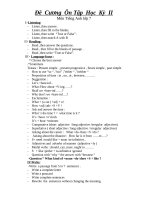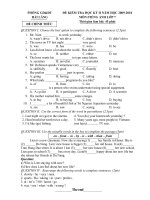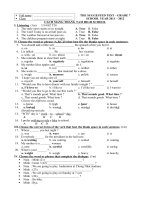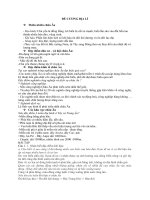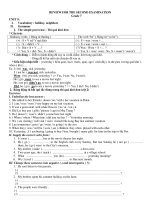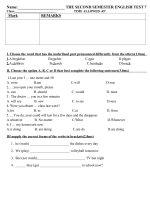Đề cương tiếng anh 7 HK2 - I-learn Smart World
Bạn đang xem bản rút gọn của tài liệu. Xem và tải ngay bản đầy đủ của tài liệu tại đây (1.5 MB, 79 trang )
UNIT 6: EDUCATION
LESSON 1
VOCABULARY
Word/Phrase
essay (n)
project (n)
homework (n)
book report (n phr.)
Test (n)
presentation (n)
Transcription
/'eseɪ/
/ˈprɒdʒekt/
/ˈhəʊmwɜːrk/
/ bʊk rɪˈpɔːrt/
/test/
/ˌpriːznˈteɪʃn/
Meaning
bài tiểu luận
Dự án
Bài tập về nhà
báo cáo sách
Bài kiểm tra
Bài thuyết trình
GRAMMAR
Have to
We use have to + infinitive without to to say it is important or necessary for
somebody to do something.
Affirmative
l/You/We/They have to do homework.
Negative
She/he has to do homework.
l/You/We/They don't have to do a test.
Questions
She/he doesn't have to do homework.
Do we/you/they have to do your homework? '
Yes, we/l/they do. / No, we/l/they don't.
Does he/she have to work on a project?
Yes, he/she does. / No, he/she doesn't.
PRONUNCIATION
♦ Sound changes.
Have to often sounds like /’hæftə/.
I have to study overnight.
They have to do this project.
♦ Pronouncing /tʃ/and/dʒ/.
• question /ˈkwestʃən/
• large /lɑːrdʒ/
• teacher /ˈtiːtʃər/
• fridge /frɪdʒ/
• check /tʃek/
• subject /ˈsʌbdʒekt/
• statue /ˈstætʃuː/
• knowledge /ˈnɒlɪdʒ/
PRACTICE
Pronunciation
Put the words in the correct columns.
watch
project
future
lunch
Words with /tʃ/ sound
biology
join
culture
geography
march
adventure
Words with /dʒ/ sound
Vocabulary
a. Match the words in the box with their definitions.
presentation
essay
homework
test
1. something teachers usually give students to do at home after school
project
_______________
2. a talk you have in front of other people to show an idea to them
_______________
3. a text that you write to answer a question or explain an idea
_______________
4. a set of questions that teachers use to check students’ knowledge
_______________
5. a piece of work that students do in school to learn more about a subject
_______________
b. Complete the sentences using the words in Exercise a.
6. There are too many mistakes in this _______________.
7. He is acting as a leader on this _______________.
8. Finish your _______________ first, then help me wash the car.
9. We’re having a speaking _______________ this week.
10. All the students have to give _______________ in turn.
Grammar
a. Put the verbs in brackets in the correct form using have to or has to.
Sam: Jane, I got some information about Jimmy’s new school.
Jane: 1) _______________ (he/wear) a uniform?
Sam: Yes, he does. 2) _______________ (we/buy) him a new one.
Jane: OK. 3) _______________ (l/drive) him to school?
Sam: No, 4) _______________ (you/not/drive) him there. He can take the school bus.
Jane: Excellent. 5) _______________ (he/be) at school early?
Sam: Well, the school bus comes at 7:30 a.m. He should be ready by then.
Jane: That’s not bad. Let’s talk to Jimmy.
b. Circle the correct options.
6. Sarah _______________ finish her geography project tomorrow.
A. had to
B. should
C. has to
D. have to
7. I _______________ do my homework today because my teacher didn’t give me
any.
A. had to
B. have to
C. has to
D. don’t have to
8. The students _______________ pass the final test for the next grade.
A. has to
B. have to
C. should
D. shouldn’t
9. _______your sister ________ help you with your homework every day?
A. Does/have to
B. Do/have to
C. Does/has to
D. Did/have to
10. Last time you ________ to work on projects in groups, but this time you ________
to work on your own.
A. have/have
B. don't have/has C. had/have
D. had/don't have
Speaking
Circle the best responses.
1. Are you free on Saturday?
A. Would you like to join us?
B. I have to study for my French test.
C. Why don’t we go out on Sunday?
D. That’s interesting. I’d love to.
2. What things do you have to do at home?
A. I have to clean the bathroom.
B. I have to give a science presentation.
C. I have to do English tests.
D. I have to work in groups on projects.
3. What things don’t you have to do at school?
A. Thanks, but I’m sorry. I can’t go bowling.
B. We don’t have to write book reports.
C. They don’t have to get good grades.
D. We don’t have to clean dishes.
4. Do you want to hang out after school today?
A. That would be great!
B. My friends are going to the sports center
C. So, I am going to the cinema alone.
D. There is a good movie on Wednesday evening.
5. Would you like to go to the cinema with me now?
A. Why? I’m doing my homework.
B. Oh no. I have to give a presentation.
C. No problem! What about Wednesday?
D. I’m sorry. I have to do my homework.
Writing
a. There is ONE mistake in each sentence. Underline and correct it.
1. We doesn’t have to go to school today.
__________
2. She has to studying a lot before the tests.
__________
3. Jane and Tom has to submit their project tomorrow.
__________
4. Does he has to attend this meeting?
__________
5. John has not to complete all his homework this afternoon.
__________
b. Put the words in the correct order to make complete sentences.
1. to / don’t / I / have / go / to / early / school / Mondays. / on
____________________________________________________________________
2. she / to / Does / finish / have / today? / homework / her
____________________________________________________________________
3. You / don’t / to / test. / worry / the / about / have
____________________________________________________________________
4. have / Park’s / to / students / home. / at / Mr / books / read
____________________________________________________________________
5. 4 o'clock. / You / to / finish / have / essay / your / by
____________________________________________________________________
UNIT 6: EDUCATION
LESSON 2
VOCABULARY
Word/Phrase
upset (adj)
fail (v)
pleased (adj)
disappointed (adj)
surprised (adj)
delighted (adj)
annoyed (adj)
pass (v)
Transcription
/ ˌʌpˈset/
/feɪl/
/pli:zd/
/ˌdɪsəˈpɔɪntɪd/
/sərˈpraɪzd/
/dɪˈlaɪtɪd/
/əˈnɔɪd/
/pỉs/
Meaning
Buồn bã
Thi rớt
Hài lịng
Thất vọng
Bất ngờ
Vui mừng
Bực bội, khó chịu
Thi đậu
GRAMMAR
Conjunction because
We use because to give the reason for something.
Students often lose marks simply because they do not read the questions
carefully.
We also use because as an answer to the question Why.
Why can't I go? - Because you are underage.
Intensifiers so and really
We can use so and really before an adjective to emphasize the adjective.
The story is really boring.
The English class is so interesting.
PRONUNCIATION
Stress intensifiers for emphasis.
You seem really tired. Are you OK?
I’m so pleased because I got an A on my test.
Stress in two and three-syllable adjectives.
Two-syllable adjectives
Three-syllable adjectives
Stress on the first syllable
♦ pleasant /ˈpleznt/
♦ difficult /ˈdɪfɪkəlt/
♦ narrow /ˈnærəʊ/
♦ national /ˈnæʃnəl/
Stress on the second syllable
♦ enormous /ɪˈnɔːrməs/
♦ annoyed /əˈnɔɪd/
♦ surprised /sərˈpraɪzd/
♦ delighted /dɪˈlaɪtɪd/
♦ direct /daɪˈrekt/
♦ fantastic /fænˈtæstɪk/
♦ upset /ˌʌpˈset/
♦ expensive /ɪkˈspensɪv/
PRACTICE
Pronunciation
Circle the word that has a stress pattern different from the others.
1. A. modem
2. A. historic
3. A. correct
4. A. delicious
5. A. previous
B. central
B. different
B. final
B. important
B. romantic
C. easy
C. popular
C. alive
C. beautiful
C. innocent
D. polite
D. similar
D. entire
D. effective
D. national
Vocabulary
a. Read the sentences. How do/did the people feel? Match each sentence with a
suitable adjective.
A. annoyed
B. pleased
C. upset
D. disappointed
E. delighted
1. Ms. Ly is a great teacher. She is going to teach US this school year. We are
all happy about that.
2. My sister is into drama. Her school club is hosting a drama next month. She is
very pleased and eager to join it.
3. Tim couldn’t listen to his teacher because the boy next to him kept talking in
class. He felt a little angry about that.
4. The boys kicked the ball through the classroom window. The principal was
very angry and he took them to the office.
5. We were excited about the trip to the aquarium. But we were unhappy that
the trip did not go as planned.
b. Complete the sentences using the words in the boxes.
disappointed
delighted
pass
fail
surprised
6. My parents expect me to ____________ all my exams with good grades.
7. When things go wrong, we might be ____________ and angry.
8. Nam’s math teacher was ____________ because he didn’t do well on his test.
9. We are really ____________ to hear he passed the test.
10. Mark studied hard because he didn't want to ____________ any tests.
Grammar
a. Match the two halves to make complete sentences.
1.
My
brother
disappointed
2. My teacher is annoyed
3. My mom is angry
4. I need another lamp
is
A. because my classmates don't Stop making
noises in class.
B.
because he failed his important test last week.
C. because my old one doesn't work anymore.
D. because my brother broke her favorite flower
vase yesterday.
5. My dad is unhappy
E.
because my sister didn’t do well in her final
exam.
b. Write the words from the text in the correct columns.
Dear Mary,
How are you doing? What about your test results? I got mine two days ago. Bad news!
I was really disappointed because I tried to study hard. My parents were so upset with
what I got. They then gave me good advice. It would help me a lot in my studies.
Feelings / Emotions
Conjunctions
Intensifiers
Reading
a. Read the letter from John to his pen pal, San. Circle the correct options.
Hi San,
How's everything? I remember the last time we wrote to each other was last July. I
finished my final examination a week ago and now I have the time to write to you. You
know! I was so happy with the results. I passed all the tests. I even got an A in math,
my favorite subject. But Spanish, history, and science grades were not that high. My
mom looked a bit disappointed. But my dad wasn't upset about my grades in those
subjects. He even said I did a good job. But I did not feel the same way as my parents.
I told myself I needed to try more in my next tests to make them pleased.
How about you? Can you tell me about your studies?
I hope to hear from you soon.
Have a lovely weekend!
John
1. When was the last time John wrote to San?
A. last week
B. last month
C. in July
D. last August
C. OK
D. very bad
2. How are John’s test results?
A. terrible
B. not so good
3. Which test did John get high marks?
A. Spanish
B. history
C. science
D. math
4. How did John's father feel when he knew the test results?
A. delighted
B. disappointed
C. unsatisfied
D. calm
5. What can John do for the next tests?
A. work harder
B. learn more about science
C. study harder for math
D. do nothing
b. Read the reply from San to John. Write Y (yes), N (no) or NG (not given).
Hi John,
I was happy to read your letter. Everything is going well now, but I was really busy with
my studies at my school. I got a lot of projects to work on, did a lot of homework, and
took different tests for a week. I was so happy with my test results because I received
high marks on all of them. It could be because I changed the way I studied. I chose to
work in groups and got practice every day.
Last week, my mother bought me a new bike as a reward. She was so pleased with
my test results. That was the most I could do to make her happy. I hope to get all As in
my upcoming exams. Do you want to discuss how to study for exams in our next
letter?
Write back soon,
San
6. San is very busy now.
_______
7. San didn’t have to do much homework.
_______
8. San passed all the tests with high marks.
_______
9. San’s mother bought her a new bicycle.
_______
10. Their next talk is about how to get all As.
_______
Speaking
Complete the conversation using the sentences in the box. There is one extra
sentence.
A. You did well in those tests.
B. That’s why I failed the test.
C. How about your other tests?
D. I got an F on my math test.
E. My mother was pleased.
F. She was really upset.
Daniel:
Hi, Bob! You look sad.
Bob:
Yeah. I’m so disappointed. 1) _____________________
Daniel:
Oh, sorry to hear that. 2) _____________________
Bob:
My other tests were not difficult.
Daniel:
I see. 3) _____________________
Bob:
Right. The math tests were too difficult. 4) _____________________
Daniel:
How did your mother feel?
Bob:
5) _____________________
Daniel:
That is bad!
Writing. Make complete sentences using the prompts.
1. Jackie / be / really annoyed / because / he / lose / math textbook.
____________________________________________________________________
2. My mother / be / disappointed / because / I / fail / English test.
____________________________________________________________________
3. My friend / be / so surprised / because / I / get I A I science test.
____________________________________________________________________
4. We / be / happy / because / Mr. James / be going to / our science teacher / next
school year.
____________________________________________________________________
5. They / be / so delighted / because / they / get / high marks / final examination.
____________________________________________________________________
UNIT 6: EDUCATION
LESSON 3
VOCABULARY
Word/Phrase
study abroad (v phr.)
share (v)
Transcription
/ˈstʌdi əˈbrɔːd/
/ʃer/
Meaning
Du học
Chia sẻ, dùng chung
experience (n)
positive (adj)
negative (adj)
make friends (v phr.)
/ɪkˈspɪriəns/
/ˈpɒzətɪv/
/ˈneɡətɪv/
/meɪk frends/
kinh nghiệm
Tích cực
Tiêu cực
Kết bạn
WRITING
A paragraph about studying abroad
1) Which country & how 1) I recently returned from studying in the United States
long you went to study
for
several
2)
What
positive
months. I'd like to share my experience studying abroad
experiences/ problems
with
you had
you. 2) I took an English language course for the first two
3) What you think about
months.
it
Although the course was short, my English improved a
lot.
That
was because I always spoke English during that time.
After
the
course, I participated in an exchange program at a
secondary
school. I studied the same subjects as the other students
at
this
school. I tried my best. However, I still needed to improve
my
English in order to understand all of the lessons. Luckily,
my
new
friends there helped me with my projects and homework.
3)
I
had
a wonderful time there and gained a lot of experience.
PRACTICE
Vocabulary
a. Complete the sentences using the words or phrases in the box. There are two
extra words or phrases.
share
university
experience
make friends
negative attitude
study abroad
positive attitude
1. She decided to ______________ in the US because she wanted to improve her
English.
2. With a(n) ______________, better things tend to happen.
3. It is not easy to ______________ at a new school.
4. If you have done that before, you will have more ______________ than others.
5. Knowing how to ______________ makes it easier for me to get along with others.
b. Complete the dialogue using the words or phrases in the boxes.
positive
experience
study abroad
May: Hey, John. What are you doing?
share
friends
John: I’m reading about scholarships in Australia.
May: You want to 6) ______________, don’t you?
John: Yeah, but I don’t have any 7) ______________.
May: It’s not easy to travel alone and study in a foreign country.
John: I know. Actually, studying in a big country has both 8) ______________ and
negative sides. One of the good things is that I can make a lot of foreign 9)
______________.
May: I think so. Please 10) ______________ some information with me then.
John: Sure.
Reading
a. Read Thanh’s blog. Write T (true), or F (false) or DS (doesn’t say).
This is my second week in the US, and I'm experiencing a lot of
things that I don't think are available back home. First, in Vietnam,
I usually have a big breakfast with some kinds of noodles, such as
phở or bún bò Huế. In the US, however, I eat pancakes or muffins
for breakfast. I sometimes eat Fruit and drink tea or coffee in the
morning. Second, everything appears to be bigger here than in
Vietnam, From Food portions to shoe sizes. An American burger,
for example, is about twice the size of a Vietnamese burger.
Besides, a size 45 sneaker is typical in America, while it is rare in
Vietnam. There are still many other interesting things about this
big country. Let me tell you about them in my next post.
Thank you for reading my post.
1. _____ Thanh went to the US three weeks ago.
2. _____ People in the US often eat some kinds of cakes for their breakfast.
3. _____ Thanh ate different kinds of Vietnamese foods while she was in the US.
4. _____ In Vietnam, shoe sizes above 45 are common.
5. _____ Thanh is going to write more about her experience in the US.
b. Read some comments on Thanh’s post. Answer each question with NO MORE
THAN TWO WORDS from the text.
I am happy to know you are having a lovely time in the US. I want
to study abroad in the future after reading your post. I am Looking
forward to reading more posts on your blog.
I am very interested in your post. Everything is also different in
Spain. Last summer, I spent my vacation in Spain. In Spain, a small
portion of beefsteak was the same size as a large portion in
Vietnam. When people greeted each other, I found it strange that
they kissed each other on the cheeks.
I didn’t have a chance to visit the US. However, I joined a one-year
exchange program in Thailand. I also experienced so many things.
Studying abroad is interesting, isn’t it?
6. What did Jane like to do after reading the post?
_______________________
7. Which country did Hoa travel to last summer?
_______________________
8. How did Hoa feel about the way people greet each other in Spain?
_______________________
9. How long did Tim study in Thailand?
_______________________
10. How does Tim think about studying abroad?
_______________________
Speaking
Anne just finished a year studying abroad. Complete the conversation between
Anna and David using the questions in the box.
A. Which country did you go to?
B. Did you have any problems?
C. What positive experiences did you have?
D. When did you come back?
E. What did you like the most there?
David:
Hi Anna! Long time no see! 1) ________________________________
Anna:
Hi David! I came back two weeks ago. How are you doing?
David:
I’m good. 2) ________________________________
Anna:
The US.
David:
3) ________________________________
Anna:
Maybe, I liked the people there the most. They came from all over the
world, and I could learn about their cultures.
David:
4) ________________________________
Anna:
I had a culture shock. Many things were not the same as in our country
David:
5) ________________________________
Anna:
Well, a lot. I made many friends there, and my English improved a lot.
David:
That sounds great, Anna.
Writing. Complete the paragraph using the sentences in the box.
A. German was not easy to master.
B. Life away from home was not easy.
C. Besides, I could improve my skills.
D. I had lots of exciting experiences when I was there.
E. However, I began to like Germany over time.
I just returned to Vietnam after four years of studying in Germany. 1) ____________.
Making friends seemed difficult at first because we came from different parts of the
world. 2) ____________. However, thanks to my friends there, my German improved a
lot. 3) ____________. I usually felt lonely. The food was also different, and I had to
cook my own meals. 4) ____________. It was a beautiful country with nice weather
and friendly people. Although it snowed a lot in winter, the roads were safe to drive on.
5) ____________. For example, I learned to look after myself and how to work with
other people.
UNIT 7: TRANSPORTATION
LESSON 1
VOCABULARY
Word/Phrase
boarding pass (n)
passport (n)
customs (n)
baggage claim (n)
suitcase (n)
backpack (n)
Transcription
/ˈbɔːrdɪŋ pæs/
/ˈpæspɔːrt/
/ˈkʌstəmz/
/ˈbæɡɪdʒ rɪkleɪm/
/ˈsuːtkeɪs/
/ˈbækpæk/
Meaning
Vé máy bay
Hộ chiếu
Hải quan
khu vực lấy hành lý (ở sân bay)
Va-li
Ba lơ
also rucksack
luggage (n)
/ˈrʌksỉk/
/ˈlʌɡɪdʒ/
Hành lý
also baggage
/ˈbỉɡɪdʒ/
GRAMMAR
Possessive Pronouns
Subjects
Possessive
I
my
Adjectives
Possessive Pronouns mine
Is that John’s backpack?
we
our
you
your
they
their
he
his
she
her
it
its
ours
yours
theirs
his
hers
-
Whose suitcase is this?
No, it’s mine. (= my backpack)
Is it yours? (= your suitcase)
Ordering adjectives
When we use more than one adjective to describe a noun, these adjectives must be
used in the proper order as in the example.
PRONUNCIATION
Stress in two-syllable nouns
Stress in two-syllable verbs
Most two-syllable nouns have stress on Most two-syllable verbs have stress on
the first syllable.
the second syllable.
• brother /ˈbrʌðər/
• forget /fərˈɡet/
• table /ˈteɪbl/
• escape /ɪˈskeɪp/
• printer /ˈprɪntər/
• enjoy /ɪnˈdʒɔɪ/
• father /ˈfɑːðər
• relax /rɪˈlỉks/
But: mistake /mɪ'steɪk/
Note
But: cancel /ˈkænsl/; copy /ˈkɒpi/
Some words have more than one stress patterns.
record /ˈrekərd/ (n)
record /rɪˈkɔːrd/ (v)
object ˈɒbdʒɪkt/ (n)
object /əbˈdʒekt/ (v)
PRACTICE
Pronunciation
Circle the word that has a stress pattern different from the others.
1. A. customs
2. A. passport
3. A. moment
4. A. finish
5. A. worry
Vocabulary
B. police
B. power
B. suitcase
B. decide
B. welcome
C. country
C. advice
C. baggage
C. control
C. return
D. system
D. nature
D. machine
D. become
D. answer
a. Read the descriptions and write a suitable word or phrase from Lesson
Summary on each line.
1. You need this to enter another country.
_______________
2. You show it and your ID card before getting on a plane.
_______________
3. An officer will check your luggage here before you get on the plane.
_______________
4. You pick up your luggage in this place at the airport.
_______________
5. You should bring it instead of a suitcase to go camping.
_______________
b. Complete the conversation with the words or phrases in the box.
A. boarding
pass
Officer:
B. backpack
C. passport
D. customs
E. suitcase
Please show me your ticket and your 6) _______________, please.
Passenger: Here they are.
Officer:
Thanks. Please put your 7) _______________ on the scale.
Passenger: Do you have to weigh my 8) _______________?
Officer:
No, you can carry it to the 9) _______________for security checks.
Passenger: Thanks.
Officer:
This is your 10) _______________. You’re leaving at gate 10. Please be
ready at the gate by 10:30 to get on the plane.
Passenger: Okay. Thanks a lot!
Officer:
You’re welcome.
Grammar
a. Choose the best options.
1. This is their / theirs problem, not our / ours.
2. My / Mine room is bigger than her / hers, but her / hers is nicer.
3. Her / Hers phone isn’t working, but my / mine is. She will call you right away.
4. Their / Theirs books are different. He / His book only has 150 pages while her /
hers has 189 pages.
5. Give me your / yours phone number, and I will give you my / mine.
b. Choose the best options.
6. I’m not going to wear that _____________ shirt to the wedding.
A. brown ugly large old
B. old brown large ugly
C. ugly large old brown
D. large ugly old brown bottles
7. Please recycle those _____________ bottles.
A. awful old small yellow
B. awful small old yellow
C. small old awful yellow
D. awful small yellow old
8. She is packing her clothes in a(n) _____________ suitcase.
A. American beautiful new big blue
B. beautiful big new blue American
C. big beautiful blue new American
D. new big beautiful blue American
9. He is carrying this _____________ backpack to go on a trip to the mountains this
weekend.
A. cool large new brown Vietnamese
B. cool new large Vietnamese brown
C. large new cool Vietnamese brown
D. Vietnamese cool large new brown
10. My sister bought a _____________ handbag last week.
A. new small pink French cute
B. cute small pink new French
C. cute small new pink French
D. French cute small new pink
Speaking
Complete the conversations with the sentences in the box. There are two extra
sentences.
A. I don’t know what hers looks like.
B. Mine? Let me check. Ah! It’s in my jacket pocket.
C. She can find hers later.
D. I can’t find our passports.
E. Do you have our passports?
F. No. Mine is dark red.
G. Yes. But we need to go to the baggage claim first.
Nick: Do we need to go through the customs again?
Phoebe: 1) ________________________
(Three minutes later)
Nick: Now, let’s look for our luggage. Oh! Is this suitcase yours?
Phoebe: 2) ________________________
Nick: I can’t see where it is.
Phoebe: Oh, my dark red suitcase is over there. Can you see Helen’s luggage?
